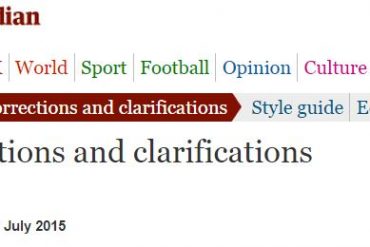The June 29th edition of the BBC World Service radio history programme ‘Witness‘ was titled “The Disputed Resort of Taba” and it was presented as follows in the synopsis.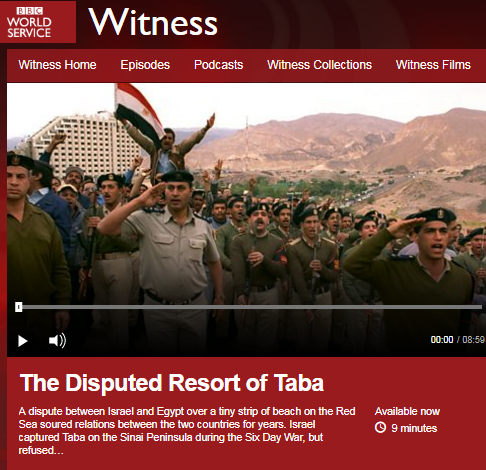
“A dispute between Israel and Egypt over a tiny strip of beach on the Red Sea soured relations between the two countries for years. Israel captured Taba on the Sinai Peninsula during the Six Day War, but refused to return it until 1989 when the Egyptians bought the luxury hotel and beach-hut village that Israeli developers had built on it. Louise Hidalgo talks to former US judge Abraham Sofaer who helped negotiate the deal.”
Somewhat bizarrely given its focus on a political/geographical dispute, presenter Louise Hidalgo introduced the programme as “part of our series looking at the history of tourism” before explaining the story.
“It was 1985 and Judge Abraham Sofaer’s first experience of trying to mediate an agreement in a part of the world known for some of the most intractable disagreements on earth. This one was over a small spit of beach 750 yards long called Taba, in the top-most corner of the Sinai Peninsula and in the southern-most tip of Israel. The Egyptians said Taba was part of Sinai and theirs. The Israelis disagreed.”
Later on listeners were told that:
“Egypt and Israel had signed their historic peace treaty in 1979 and under the Camp David Accord Egypt recognised Israel in return for Israel handing back the Sinai Peninsula which it had captured during the 1967 Six Day War. The Israelis kept their promise and three years later withdrew from all of Sinai except for Taba. And in the years that followed the tiny enclave on the Israeli border had become a running sore in the peace between these two adversaries.”
Listeners then heard an unidentified recording – presumably from the BBC’s archive.
“The Israelis built their frontier post just north of the hotel. The Egyptians put up their post just to the south. And in between sits the hotel; run by the Israelis, lusted after by the Egyptians. To the Israelis it’s a matter of simple economics: Taba is a great draw for tourists. For the Egyptians it’s a matter of principle.”
All well and good, but then the programme got to the subject of the Sinai Peninsula’s old boundary, with Hidalgo saying to Sofaer:
“And something else that you found out during those negotiations was that the formidable Israeli politician and soldier the late Ariel Sharon who’d played a big part in capturing the Sinai Peninsula in 1967, after the war Sharon had had these pillars or posts marking the border around Taba moved, hadn’t he? This was the border that had been set decades earlier by the…by the British. What happened?”
Sofaer: “It was a feeling on Sharon’s part that the British had been deliberately unfair in determining the border and the border where the pillars were was not an advantageous border for Israel. And then he essentially ordered his people after the ’67 war to knock down the border pillars […] and the Egyptians said we’re sure they knocked down the border pillars deliberately. And the Israelis would tell me ‘yes; I was there’ said this general. ‘I was there and I saw him order that the pillars be knocked down’. So there was this sense among the Egyptians that the Israelis were just being willful.”
Whether or not that story is accurate is unclear but certainly BBC audiences are not given the full background to the story. No attempt is made to explain why or on what authority the British – who at the time had occupied Egypt since 1882 without any legal basis – set that boundary in 1906. In his book “The Boundaries of Modern Palestine 1840-1947”, Professor Gideon Biger explains:
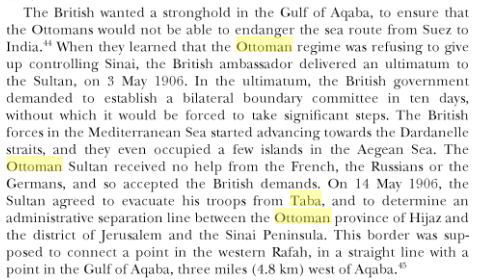

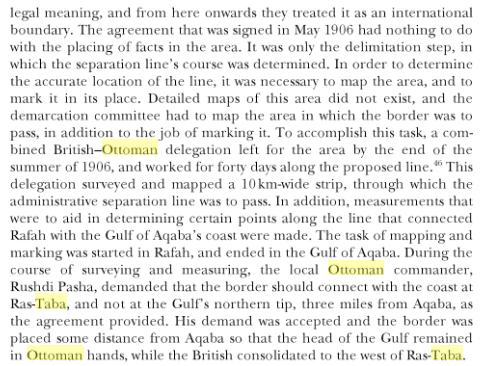
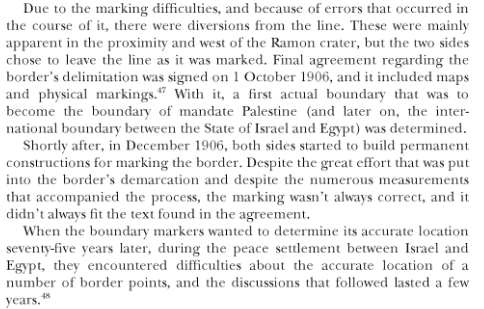
In other words, the pillars that may or may not have been “knocked down” did not necessarily reflect the boundary defined in the agreement between the British and the Ottomans.
As the New York Times reported at the time of the dispute:
“The Israeli claim is based on the fact that when the Egyptians and the Turks marked the Sinai border, they said each border pillar could be seen from the one before it.
Israel contends that the border runs either through the ”granite knob” overlooking Nelson Village or through the cluster of palm trees at the end of the public beach – both of which afford a clear view of the previous pillar, even though today there are no border pillars at either place.
The Egyptians assert that the border is a few hundreds to the east of the Sonesta Hotel, where one can find atop a hill the remains of a supposed border pillar.
The only problem is that from the Egyptian spot it is impossible to see the penultimate pillar, which means no inter-visibility as the history books said.”
Towards the end of the programme Hidalgo told listeners that:
“An international panel was set up to arbitrate on the border, eventually ruling in favour of Egypt.”
The details of that panel’s deliberations and conclusions – including a copy of the original Anglo-Ottoman agreement and Professor Ruth Lapidoth’s dissenting opinion – can be found here.
Sadly for audiences, that complex story with its British colonial roots has been dumbed down by the BBC into a tale of an Israeli moving some posts.




